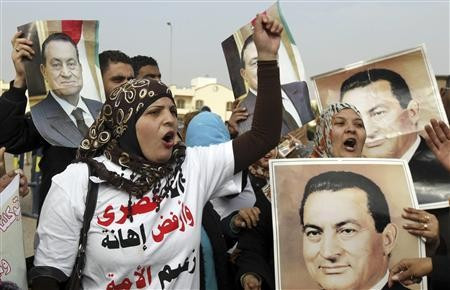Egyptians Head to Polls Again in Parliament Vote

Egyptians have been voting in the third round of a parliamentary election that has so far handed Islamists the biggest share of seats in an assembly that will be central in transition from army rule.
Islamist groups came late to the uprising that unseated President Hosni Mubarak last February, but were well placed to seize the moment when Egyptians were given the first chance in six decades to choose their representatives freely.
The Muslim Brotherhood led after the first two rounds, and the strong showing by Islamist parties has sown unease among Western powers that only disowned Mubarak once his three-decade rule was crumbling.
The ballot has been overshadowed by the deaths of 17 people last month in clashes between the army and protesters demanding the ruling military council hand power immediately to civilians. The army says the poll process will not be derailed by violence.
The concluding vote to parliament's lower house takes in regions of the rural south, which has the largest proportions of Christian voters, the Nile Delta region north of the capital Cairo, and the restive Sinai desert region to the east.
Turnout in earlier rounds was far higher than in Mubarak's day, when ballot stuffing, thuggery and vote-rigging guaranteed landslide wins for his party.
"I woke up early to go to vote in my village before going anywhere else," said Mostafa Mohamed Ali, a factory worker from Mahalla el-Kubra in the industrial heartland north of Cairo where labor unrest was a precursor to the wider protests that brought down Mubarak.
"This is the most important thing for me now, of course, and for all of the country as well," said Ali.
Streets in Mahalla were dotted with posters from several parties, especially the hardline Islamist al-Nour party, promising an end to corruption.
Monitors praised the first two rounds as relatively free of irregularities.
But police raids on pro-democracy and rights groups last week have disrupted the work of leading Western-backed election monitors and drawn accusations that the army was deliberately trying to weaken oversight of the vote and silence critics.
The government said the raids were part of an investigation into illegal foreign funding of political parties and not aimed at weakening rights groups, which have been among the fiercest critics of the army's rule.
The United States called on Egyptian authorities to halt "harassment" of the groups involved.
The US-funded International Republican Institute (IRI) said it had been invited by Egypt's government to monitor the election and did not give funding to political parties or civic groups.
It urged the government to let staff return to their offices and obtain the official registration they had long requested.
"There is no reason not to allow IRI to assess the elections," the IRI said in a statement.
Fierce rivalry
Egyptians turned out in unprecedented numbers in the first two rounds and parties ranging from hardline Islamists to liberals and secularists are competing hard for every vote.
Liberals accuse groups like the Muslim Brotherhood and the hardline Islamist Al-Nour party, which surprised with a strong showing in earlier rounds, of flouting a ban on religious slogans in politics and telling voters their rivals were ungodly.
"We have been trying to tell people in our campaign before the third stage that we respect religions," said Mohamed Abu Hamed, secretary general of the liberal Free Egyptians party.
Islamists in turn accuse one of the party's top figures, Coptic Christian business tycoon Naguib Sawiris, and others of using media that they control to mount a disinformation campaign against them.
The Muslim Brotherhood's Freedom and Justice Party said in a statement it demanded from "media outlets, especially those owned by businessmen who ... still have interests with the previous regime, to remain objective and stop distorting this experience, which people have been waiting for a long time."
Although Islamists command a majority of seats contested so far, fierce rivalry among the various Islamist groups offers scope for liberals to wield influence in the parliament, which will play a role in defining a new constitution for Egypt.
Mubarak painted his government as a modernising bulwark against Islamist militants who threatened Egypt's future prosperity and its peace treaty with neighboring Israel.
The Muslim Brotherhood, which built a broad grass-roots support base through decades of charity work among millions of poor Egyptians, says it will do nothing to weaken Egypt's economy further or sow social chaos.
That message of stability has found resonance among ordinary Egyptians tired of almost a year of political turmoil and fearful for their livelihoods as the economy wallows in crisis.
Fourteen million eligible voters in nine regions will choose who occupies 150 of the seats in parliament.
The army, under pressure to hasten the handover to civilian rule, issued a decree on Sunday to shorten the forthcoming upper house election to two rounds from three.
© Copyright IBTimes 2025. All rights reserved.





















